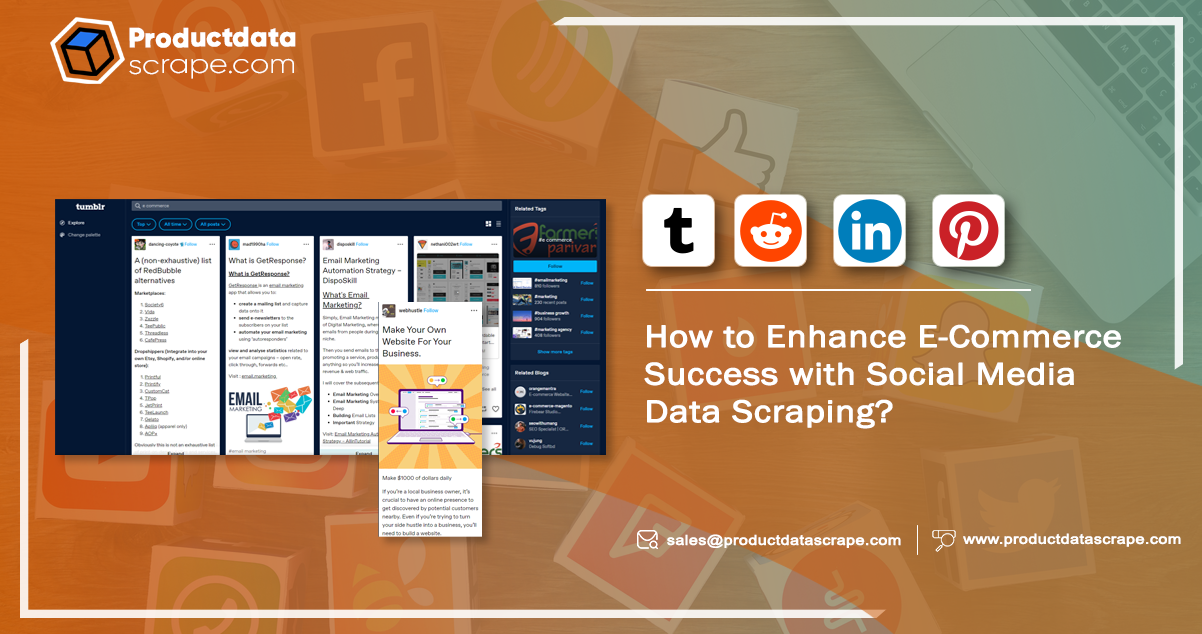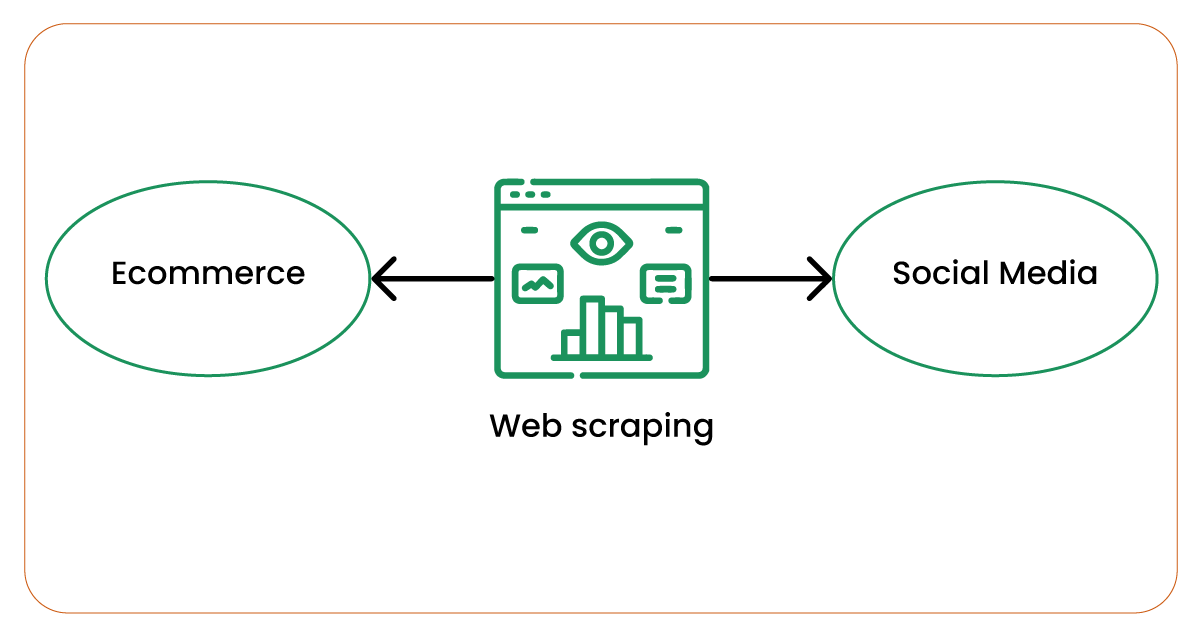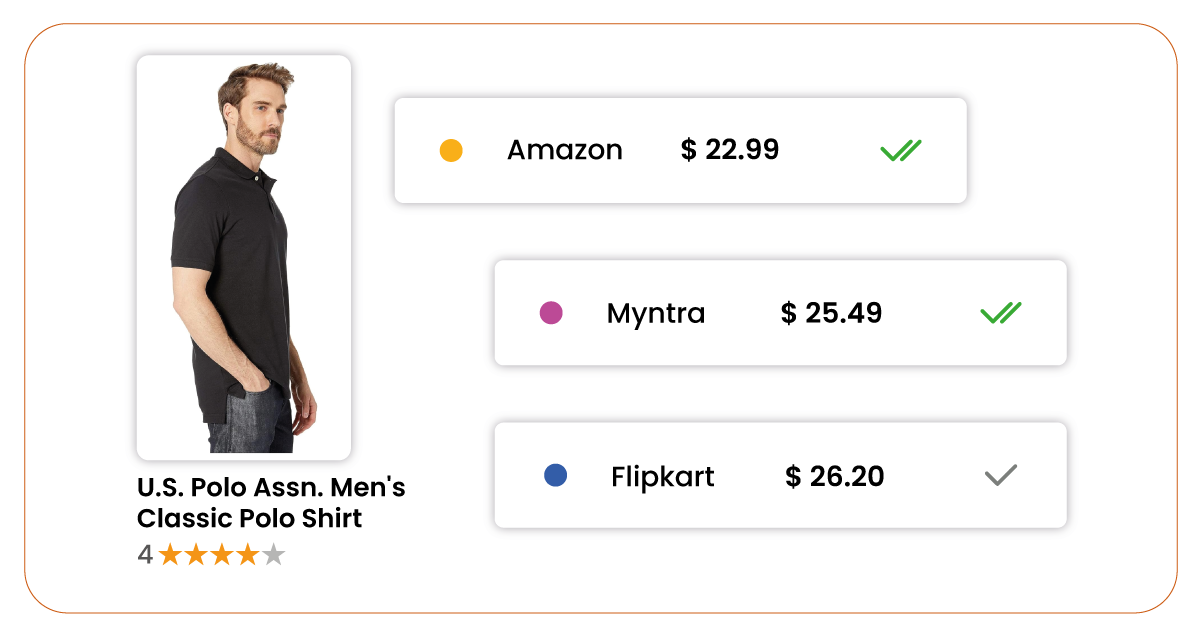
The e-commerce sector is highly competitive, with companies constantly seeking ways to optimize sales. Leveraging web data is a crucial strategy for achieving this goal. By extracting data from various websites and social media platforms and implementing effective recommendation systems, businesses can offer highly relevant and targeted consumer suggestions, significantly enhancing the likelihood of successful sales. Consequently, web scraping and data analytics emerge as crucial catalysts for the growth of e-commerce enterprises.
In today's fiercely competitive online market, the importance of a robust e-commerce strategy is not ignorable for any business. It is precisely where the concept of e-commerce scraping comes into play, providing businesses with the means to collect crucial data from diverse sources. This data is a foundation for refining their strategies and maintaining a competitive edge.
In our blog series, we delve deep into the advantages of e-commerce data scraping, illustrating how it can assess market dynamics and competitors, analyze sentiment data, enhance e-commerce sales, and monitor rivals' strategies.
Recognizing the immense potential of data and harnessing the capabilities of web scraping e-commerce data empowers businesses to make informed decisions and realize their desired goals. However, it's essential to acknowledge that some challenges and considerations come with implementing this strategy. We invite you to stay tuned and learn how e-commerce scraping can be valuable in maximizing your e-commerce strategy.
For those operating e-commerce businesses, it's worth noting that while using an e-commerce scraper to gather competitive data is essential, notice the well-being of your employees. Encouraging your staff to prioritize their mental and physical health can increase productivity, creativity, and overall job satisfaction.
The Necessity of Web Scraping in E-Commerce

The rise of e-commerce has revolutionized how we shop, offering the convenience of buying almost anything from the comfort of our homes, from clothing and furniture to electronics and groceries, often with doorstep delivery within a day. However, e-commerce is also among the riskiest and most competitive industries. Numerous factors affect successful transactions, leading to increased uncertainty. Companies now implement policies like free delivery, try-before-you-buy options, and full refunds to maintain competitiveness, further escalating transaction risks.
Increasing the likelihood of successful sales becomes paramount for companies to minimize losses in this landscape. Businesses must instill the same sense of security in online shoppers as they would experience in physical stores, driving maximum online engagement. Therefore, policies like free delivery and hassle-free returns must persist. Companies must explore alternative strategies to boost sales per customer visit.
Web scraping plays a pivotal role in addressing these challenges. In today's internet-driven landscape, data is a powerful tool capable of solving many business problems. E-commerce enterprises can harness data by extracting it in a structured format and analyzing it. This process helps identify the key factors contributing to substantial losses, monitor competitive pricing strategies, pinpoint poorly-reviewed products or sellers, and provide customers with location-based and personalized product recommendations. Scraping data from e-commerce websites has evolved into a vital operation for e-commerce companies, enabling them to thrive in a fiercely competitive market.
Significance of Web Scraping
E-commerce data scraping service is instrumental in these three critical aspects of e-commerce, empowering businesses to remain competitive, build trust with consumers, and boost sales through personalized recommendations.
Real-time Competitor Price Monitoring: Staying competitive in the market requires constant vigilance over competitors' pricing strategies. Web scraping plays an essential role in competitor e-commerce price monitoring by collecting structured data from competitors' websites, which is helpful for easy comparison and analysis. This data extends beyond product prices to include deals and promotions, ensuring consumers remain engaged with your platform. For instance, e-commerce giants like Flipkart, Myntra, and Amazon synchronize their sales events to keep consumers engaged. Web scraping enables companies to stay informed about competitors' announcements and adapt their strategies accordingly.

Product Reviews and Ratings: Customer reviews and ratings are pivotal in building trust and credibility for products and services. Shoppers often rely on the experiences of other consumers when making purchasing decisions. Providing unbiased and authentic reviews and ratings is crucial for instilling confidence in buyers. Web scrapers help aggregate reviews and ratings from various platforms, providing insights into market performance. This data aids retailers in making informed decisions about product shelving, pricing adjustments, and market strategies. Additionally, it helps identify which retailers are selling products most profitably, allowing for strategic price and delivery modifications
Target Audience Identification and Personalized Recommendations: E-commerce heavily depends on understanding and catering to the preferences of individual consumers. Recommending the right products to the right audience is pivotal for increasing sales. By analyzing past purchases and browsing history, businesses can identify a customer's preferences and recommend products aligned with their interests and budget. For example, a customer who previously bought multiple t-shirts in the Rs.800 - Rs.1000 range should receive recommendations for similar clothing items. Web scraping product data provides businesses with structured data about individual customers, which can be leveraged by recommender systems to offer personalized and relevant product suggestions, enhancing the overall shopping experience.
The Advantages of Social Media Data for E-Retailers

Social media plays a crucial role in the e-commerce industry by enabling companies to directly observe and influence consumer behavior while delivering timely recommendations, ultimately enhancing the likelihood of making a sale. Platforms like Instagram and Pinterest allow businesses to link their profiles with their online stores, facilitating seamless transitions for users from social media posts to purchase pages.
Tracking User Activity Patterns: Each individual maintains a unique daily routine influenced by location and age. Scrape e-commerce and retail data to monitor user activity and creating user profiles, companies can gain insights into the most probable times and durations of social media engagement. This data becomes invaluable for delivering content at optimal times to maximize visibility.
Analyzing Activity History: People have diverse interests, making presenting identical content to every consumer impractical. Social media platforms serve as reservoirs of user preferences and interests. Data harvested from users' interactions on these platforms helps recommend products aligning with their interests. For instance, if someone frequently engages with video game-related content, suggesting video games and gaming products becomes relevant. In contrast, gardening equipment is as per to a user interested in gardening posts.
Leveraging Location Data: Users often share their current locations and upcoming events on social media. Geographical information obtained through social media data scraping can inform recommendations based on products commonly purchased in the user's vicinity or anticipated destinations. For instance, if someone posts from a hill station, suggesting warm clothing like woolen apparel is appropriate, or if a user plans to attend a marathon event, recommendations may include sports shoes, socks, and sweatshirts.
Harnessing Social Connections: Social media revolves around interpersonal relationships, allowing collaborative filtering techniques to be applied. If two users, A and B, are friends and have previously purchased similar products, suggest person A new products that person B has recently bought. This approach relies on the assumption that friends often share similar interests, leading them to make similar purchase decisions.
Conclusion: Web scraping is a powerful tool to collect essential social media data required for the above recommendations from various platforms, providing proper permissions. This process can be automated for efficiency, ensuring data is regularly refreshed and organized into structured formats without relying on human intervention. Precisely processing this data can make a significant distinction between a company and its competitors, enabling businesses to derive valuable insights and gain a competitive edge.
At Product Data Scrape, we maintain the highest ethical standards in all operations, including Competitor Price Monitoring Services and Mobile App Data Scraping. With a global presence spanning multiple offices, we consistently deliver exceptional and honest services to meet the diverse needs of our valued customers.



































.webp)






